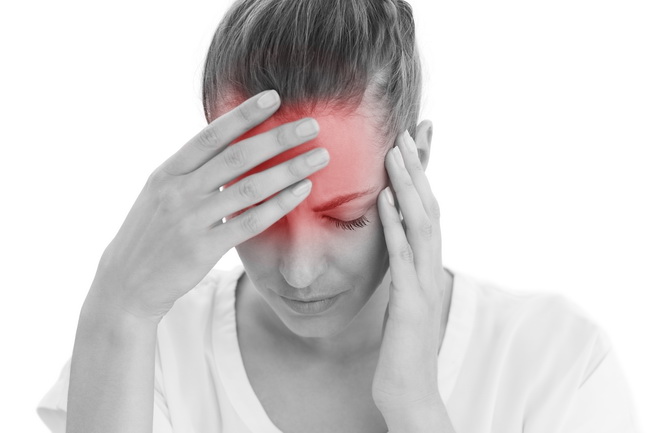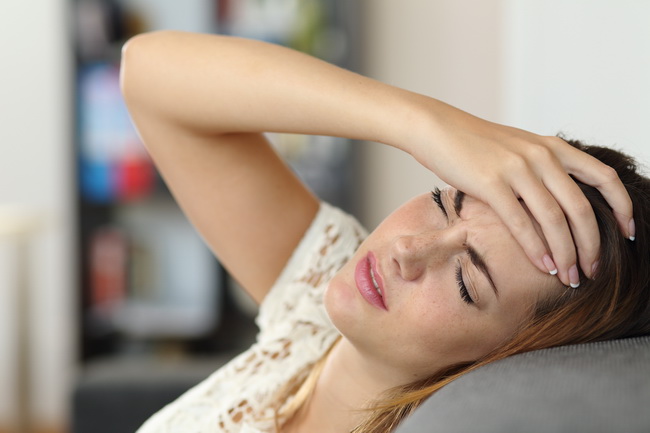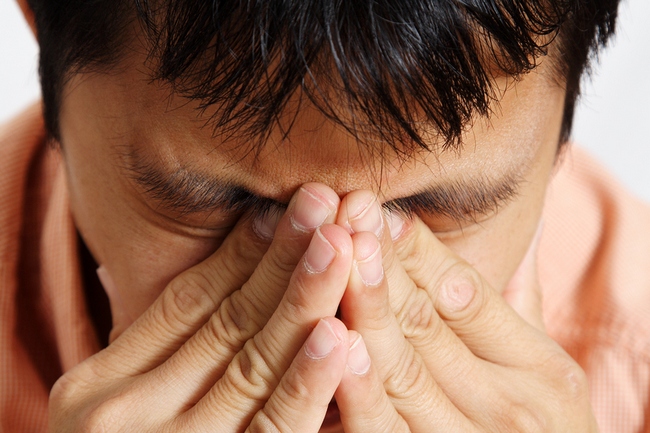- Make It Yourself Lavender Heart-Shaped Bath Bombs!
- 20 Things You Never Knew About “Down There”
- 12 Best Foods For Those Suffering From Arthritis Pain
- 12 Personal Hygiene Mistakes Almost Everyone Makes (Mom Never Told You About #4!)
- 15 Medicinal Plants And Herbs From The Cherokee People
- 12 Mind-Blowing Benefits Of Drinking Coconut Water During Pregnancy
- 12 Outstanding Winter Foods That Won’t Fatten You Up Like A Christmas Turkey
14 Types Of Headaches And How To Make Them Go Away!

Photo credit: bigstock.com
Headaches are a pain in the … well, the head, of course, but they can be so much more than that. If you have ever had a migraine, you know that they can make your entire life come to stop. Sinus headaches can make you feel as if your head alone weighs 50 pounds.
Common tension headaches are not a big deal, but did you know that there are probably 14 different types of headaches? We know a great deal more about headaches than we did 20 or 30 years ago, but there remains a great many mysteries about headaches that we have yet to discover.
Let’s take a look at the 14 different types of headaches and, most importantly, how you can get rid of them and keep them from becoming a regular pain much lower down.
1. The Weekend Headache
Some people experience headaches that mainly seem to happen on weekends. Although the exact cause is not known (we aren’t talking about hangover here!), it’s thought to be the result of oversleeping, going to bed later than normal, or a withdrawal from caffeine. Also, for those who have highly stressful jobs, the release you feel on the weekend can sometimes trigger a headache. Try sticking with your normal sleeping and waking hours, drinking a cup of coffee as soon as you wake up, and practicing yoga or mediation during the week to release stress before the weekend arrives.
2. The Rebound Headache
If you have ever used spray type nasal decongestants, you have found that they can lead to a perpetually stuffy nose. The same is true of rebound headaches, which are often caused by the overuse of over-the-counter pain medications. If you take any type of pain reliever, such as ibuprofen, aspirin, or even Tylenol more than twice a week, or if you take triptans (migraine drugs) more than 10 days each month, you are at a greater risk for rebound headaches. You have only two choices here. Live with the headaches, and stop taking all pain medications for 90 days, or see your doctor for alternatives.
3. The Period Headache
As if PMS were not enough to deal with, a sudden drop in estrogen right before your cycle starts can often trigger headaches or even migraines. If you regularly get headaches about three days before and two days after your period starts, you are experiencing a menstrual or period headache. Try taking magnesium supplements about six to 10 days before your period is supposed to start.
Continue to Page 2

Photo credit: bigstock.com
4. The Tension Headache
This is the most common type of headache. This headache usually feels like a constant ache or pressure — not throbbing — on both sides of the head. Sometimes it appears at the back of the head and includes the neck. These headaches are triggered by things such as bad posture, anxiety, clenching the jaw, and stress. They can become chronic, but the good news here is that they aren’t severe. Try stress-relieving stretching exercises, yoga, or meditation. You can also check that your office space is set up so that there is less strain on your neck, shoulders, and back.
5. The Daily Headache
If you have headaches at least 15 days each month for more than a three-month period of time, you are considered to have chronic daily headaches. The cause of these is unknown but they could be rebound headaches; due to head injury; eye strain, or even meningitis or a brain tumor. Don’t worry about the last two, as they are very rare. Pain is your body’s way of telling you something is wrong, however, so speak to your doctor about possible causes and solutions. You might want to consider going to a headache clinic, which specializes in these types of headaches.
6. The Dental Headache
Sometimes, dental problems such as TMJ (temporomandibular joint disorder) or bruxism (grinding the teeth at night) can cause headaches. TMJ can be due to stress, poor posture, arthritis, or a bad alignment of the jaw. Bruxism can often be stopped by a simple dental appliance you wear at night that prevents you from grinding your teeth. TMJ is more complicated. See a dentist who specializes in TMJ for diagnosis and relief.
Continue to Page 3

Photo credit: bigstock.com
7. The Sinus Headache
This type of headache should get a gold medal for being both misdiagnosed and over-diagnosed. Many doctors confuse migraines with sinus headaches. In fact, one study found that more than 87 percent of people with “sinus headaches” were actually suffering from migraines. The most common symptoms, such as watery eyes, sinus pressure, and nasal congestion, can happen with both sinus headaches and migraines. A true sinus headache is related to an infection. These types of headaches can be resolved over time. A migraine will make you sensitive to light, sound, and cause nausea.
8. The Cluster Headache
Not truly headaches, but most people believe that they are. The pain of a cluster headache is so intense that many people refer to them as suicide headaches, because some people have actually committed suicide rather than deal with another one. Cluster headaches generally happen at night, soon after a person falls asleep. They experience an excruciating pain on one side of the head, near the ear, with the pain radiating outwards across the face and under the jaw. Episodes can last from 15 minutes to three hours, and over-the-counter pain medications do nothing to stop the pain. This “headache” is actually caused by a swelling of the blood vessel that is right next to the joint of the jaw and ear. When it swells, it touches a nerve, causing intense pain. Doctors do not know the cause of this, but many people believe it is related to stress. Taking a steroid at the first sign of a cluster headache, such as prednisone, over a 10-day period seems to stop them but they can reoccur. See a doctor if you believe you are experiencing cluster headaches.
9. The Brain Tumor Headache
Yes, brain tumors generally cause people headaches but relax — these are the most uncommon types of headaches. Consider other options before you jump on this one.
10. The Migraine Headache
Although migraines are not completely understood, one thing doctors do know is that certain things trigger migraines. Some of them are out of your control, such as hormonal changes or stress, but some triggers are within your control, such as sleeping or eating patterns. If you know, for example, that skipping meals is a trigger, always keep something in your pocket or purse for munching such as nuts, dried fruit, or a hardboiled egg. Keep a notebook to try to determine your triggers and then avoid them! When that fails, treatments can vary, but most people find relief from triptans such as Zomig or Imitrex.
Continue to Page 4

Photo credit: bigstock.com
11. The Early Morning Headache
Some people find that they have headache first thing when they wake up in the morning. Sometimes this is due to a lack of caffeine, but if a cup of coffee does not resolve your headache, it could be that you suffer from sleep apnea or one of the dental headache problems listed above.
12. The After Sex Headache
No ladies, that before sex headache is something else entirely; we are talking about the one many young people get after sex. Although these are rare, they do happen, especially to younger men. They generally start sometime after intercourse begins and finish with a type of thunderclap headache pain at the point of orgasm or soon afterwards. Again, these types of headaches are rare, so speak to your doctor if you experience these.
SEE ALSO: Top 6 Dangerous Headaches That Should Send You Straight To The Doctor
13. The Caffeine Headache
Or should we call it the lack of caffeine headache? That is actually the cause. Caffeine is mildly addicting, and when your body doesn’t get its regular dose, it will let you know with a tremendously unpleasant headache. You can either quit this addiction altogether or continue to feed it. Over-the-counter remedies can help in a pinch.
14. The Dull Persistent Headache
If you have ever had one of those dull, throbbing headaches, you know how persistent they can be. Sometimes they literally go on for days at a time if you don’t take some type of pain reliever. Doctors do not know the cause of these headaches, and they usually go away on their own, but you might want to try a natural remedy like lavender tea before you resort to those over-the-counter pain relievers. If you find that you get these dull, throbbing headaches more than three or four times each month, you should consider seeing your doctor, as it could be a sign of a more serious problem.
References:

































